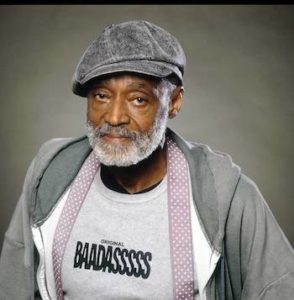
Melvin Van Peebles
*Melvin Van Peebles was born on this date in 1932. He was a Black artist, author, film actor, director, and producer.
Born in Chicago, IL, Van Peebles was raised in a working-class home headed by his father, who was a tailor. After high school, he attended Ohio Wesleyan University, graduating with a B.A. in English in 1953. From there, he served three years as a navigator and bombardier in the U.S. Air Force Strategic Air Command starting in 1954. After leaving the Air Force, he lived in Mexico, where he worked as a portrait painter and met his wife, photographer Maria Marx. The couple soon gave birth to a son Mario Van Peebles.
He moved back to the United States and made his first short films - "Sunlight" (1958) and "Three Pickup Men for Herrick" (1958), while working in a San Francisco post office. He went on to live in Holland and France, working as a reporter in Paris, where he also began writing French-language books, Un Ours pour le F.B.I. (1964), Un Americain en enfer (1965), and La Fete a Harlem (1967). With a grant from the French Cinema Center, Van Peebles made his feature debut by adapting his novel La Permission (1967) into "The Story of a Three-Day Pass" (1967), a romantic drama about the relationship between a Black soldier (Harry Baird) and a white French girl (Nicole Berger).
The film was selected as the French entry in the 1968 San Francisco Film Festival, where some American reviewers embraced the picture as a promising directorial debut. Choosing between various offers from American studios, Van Peebles returned to the United States to direct and score the sharp-edged comedy, "The Watermelon Man" (1970), about a white bigot played by Black comedian Godfrey Cambridge in whiteface - who wakes up one day to discover he has become Black.
Around the time he was filming, Van Peebles recorded his first album, Brer Soul (1969), a spoken word album that was subsequently cited as a precursor to rap music. Combining his musical and narrative talents, he wrote the book, music, and lyrics for "Ain't Supposed to Die a Natural Death" (1971), a series of 19 darkly comic politically-themed monologues about life for African Americans in the ghetto which earned seven Tony Award nominations, including one for Best Musical. In 1971, Van Peebles independently produced, directed, wrote, scored, and acted in his best-known film, "Sweet Sweetback's Baadasssss Song." The film cost $500,000, including $50,000 borrowed from comedian Bill Cosby and grossed over $14 million. "Sweetback" was one of the first films to define an African American aesthetic while helping to usher in the blaxploitation movies of the 1970s.
In 1972, Van Peebles composed for theater an adaptation of his novel Harlem Party called "Don't Play Us Cheap," for which he wrote both the book and music and earned two Tony Award nominations. Though he filmed a version the following year, the movie was not released on video in the mid-1990s. In 1976, Van Peebles segued to television, scripting and composing the title song for a small-screen movie, "Just an Old Sweet Song." In 1977, he wrote the screenplay for "Greased Lightning," a low-budget biopic starring Richard Pryor as Wendell Scott, the first black racecar driver. In 1978, Van Peebles moved on to writing the pilot for "Down Home." He made his television-acting debut in the three-part miniseries "The Sophisticated Gents" in 1981, from 1983 to 1987.
As a businessman, Van Peebles worked on Wall Street as a trader at the American Stock Exchange. Though initially planning to partake for just six months, he instead spent several successful years on Wall Street, even penning an investing how-to book, Bold Money: A New Way to Play the Options Market (1986), and forming his own municipal bonds firm, Van Peebles and Hayes Municipal Securities, in 1987.
Other Van Peebles acting credits include "O.C. & Stiggs" (1987) and "Jaws: The Revenge" (1987) "Sonny Spoon" (NBC, 1988), "Identity Crisis" (1989) "Boomerang" (1992), and "Posse" (1993) "Tales of Erotica" (1994) and "Panther" (1995). In 2003, Van Peebles appeared as Sweetback in "The Hebrew Hammer." He was the next subject of director Joe Angio's documentary "How to Eat Your Watermelon in White Company (and Enjoy It)" (2005). After a prominent supporting role in "Blackout" (BET, 2008). He moved on to co-directed "Gang in Blue" (1996) "Classified X" (1998), "Le Conte du Ventre Plein" (2000), and "Confessions of an Ex-Doofus-Itchyfooted Mutha" (2009).
In 2017, Methane Momma, a short film directed by Alain Rimbert, featured Van Peebles and his narration of poetic work with musical accompaniment by The Heliocentrics. In 2019, Burnt Sugar presented the film Sweetback in Brooklyn while playing their interpretation of the soundtrack. Van Peebles appeared at the presentation.
Melvin Van Peebles died in Manhattan, NY, on September 21, 2021.
